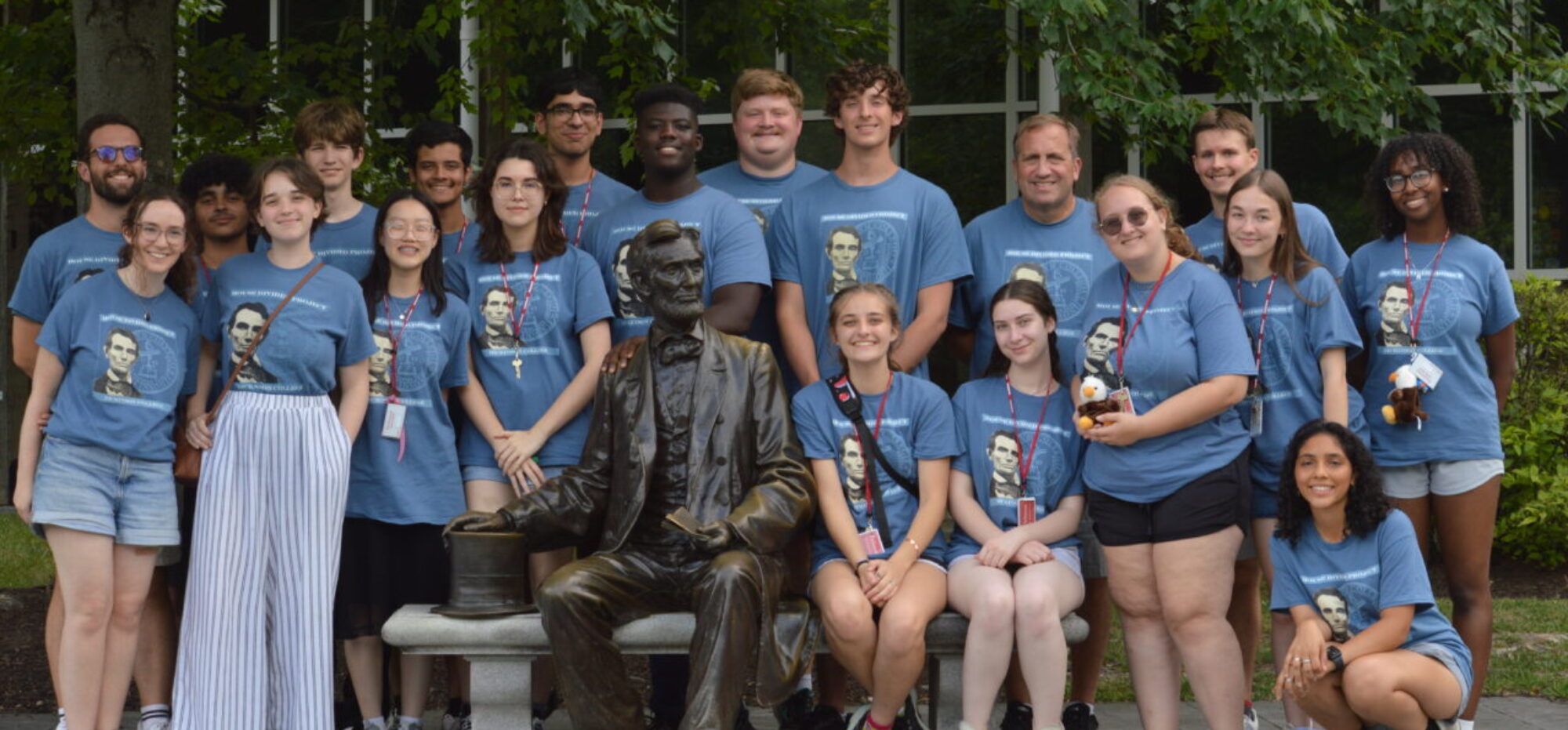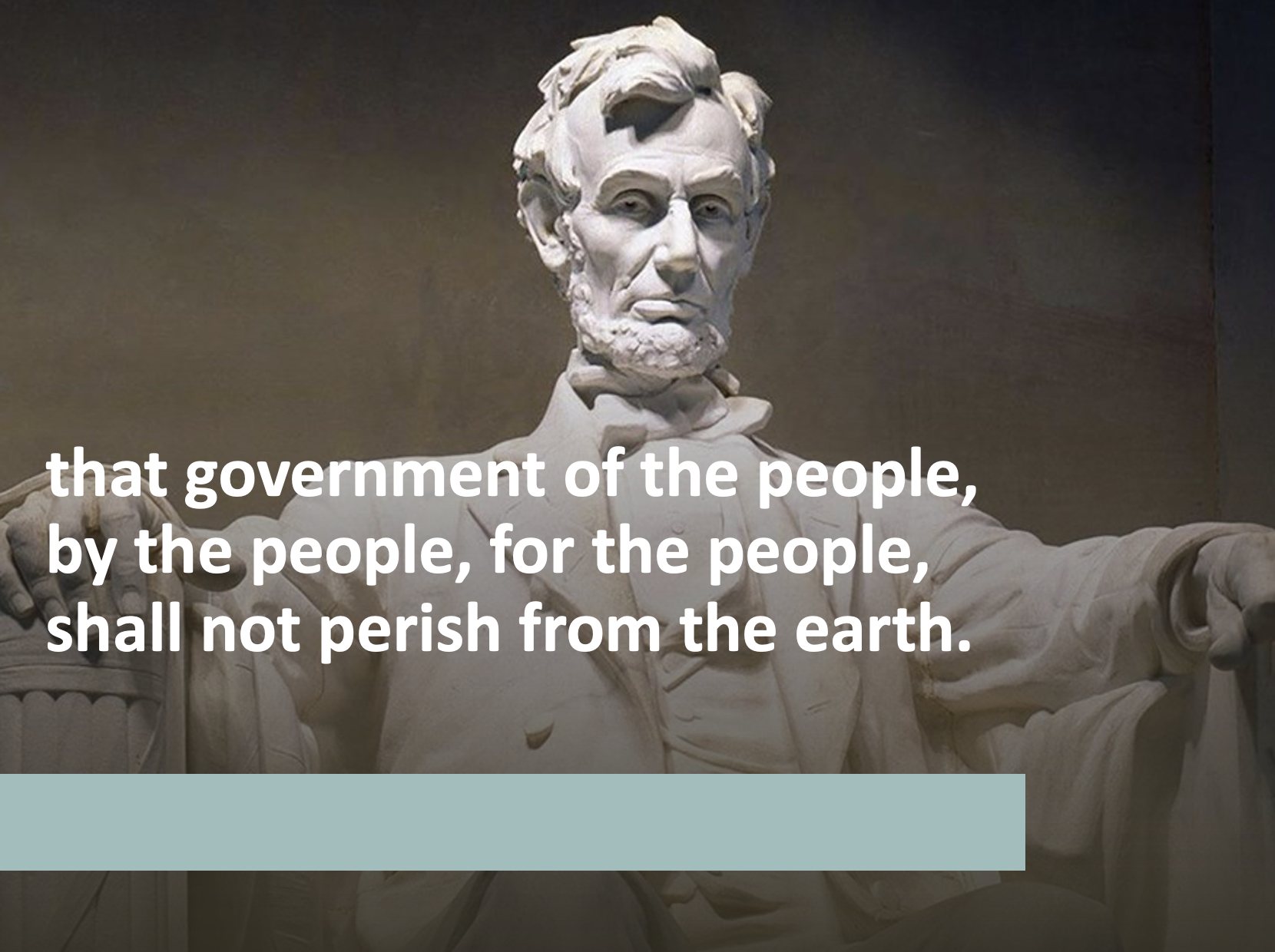Speech at Peoria, October 16, 1854
Let us re-adopt the Declaration of Independence, and with it, the practices, and policy, which harmonize with it.
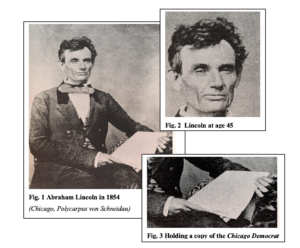 “Near eighty years ago we began by declaring that all men are created equal; but now from that beginning we have run down to the other declaration, that for SOME men to enslave OTHERS is a “sacred right of self-government.” These principles can not stand together. They are as opposite as God and mammon; and whoever holds to the one, must despise the other. When Pettit, in connection with his support of the Nebraska bill, called the Declaration of Independence ‘a self-evident lie’ he only did what consistency and candor require all other Nebraska men to do. Of the forty odd Nebraska Senators who sat present and heard him, no one rebuked him. Nor am I apprized that any Nebraska newspaper, or any Nebraska orator, in the whole nation, has ever yet rebuked him. If this had been said among Marion’s men, Southerners though they were, what would have become of the man who said it? If this had been said to the men who captured Andre, the man who said it, would probably have been hung sooner than Andre was. If it had been said in old Independence Hall, seventy-eight years ago, the very door-keeper would have throttled the man, and thrust him into the street.
“Near eighty years ago we began by declaring that all men are created equal; but now from that beginning we have run down to the other declaration, that for SOME men to enslave OTHERS is a “sacred right of self-government.” These principles can not stand together. They are as opposite as God and mammon; and whoever holds to the one, must despise the other. When Pettit, in connection with his support of the Nebraska bill, called the Declaration of Independence ‘a self-evident lie’ he only did what consistency and candor require all other Nebraska men to do. Of the forty odd Nebraska Senators who sat present and heard him, no one rebuked him. Nor am I apprized that any Nebraska newspaper, or any Nebraska orator, in the whole nation, has ever yet rebuked him. If this had been said among Marion’s men, Southerners though they were, what would have become of the man who said it? If this had been said to the men who captured Andre, the man who said it, would probably have been hung sooner than Andre was. If it had been said in old Independence Hall, seventy-eight years ago, the very door-keeper would have throttled the man, and thrust him into the street.
Let no one be deceived. The spirit of seventy-six and the spirit of Nebraska, are utter antagonisms; and the former is being rapidly displaced by the latter.
Fellow countrymen—Americans south, as well as north, shall we make no effort to arrest this? Already the liberal party throughout the world, express the apprehension ‘that the one retrograde institution in America, is undermining the principles of progress, and fatally violating the noblest political system the world ever saw.’ This is not the taunt of enemies, but the warning of friends. Is it quite safe to disregard it—to despise it? Is there no danger to liberty itself, in discarding the earliest practice, and first precept of our ancient faith? In our greedy chase to make profit of the negro, let us beware, lest we ‘cancel and tear to pieces’ even the white man’s charter of freedom.
Our republican robe is soiled, and trailed in the dust. Let us repurify it. Let us turn and wash it white, in the spirit, if not the blood, of the Revolution. Let us turn slavery from its claims of ‘moral right,’ back upon its existing legal rights, and its arguments of ‘necessity.’ Let us return it to the position our fathers gave it; and there let it rest in peace. Let us re-adopt the Declaration of Independence, and with it, the practices, and policy, which harmonize with it. Let north and south –let all Americans– let all lovers of liberty everywhere–join in the great and good work. If we do this, we shall not only have saved the Union; but we shall have so saved it, as to make, and to keep it, forever worthy of the saving. We shall have so saved it, that the succeeding millions of free happy people, the world over, shall rise up, and call us blessed, to the latest generations.”
Lincoln to George Robertson, August 15, 1855
The fourth of July has not quite dwindled away; it is still a great day–for burning fire-crackers!!!
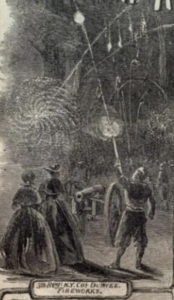
“On the question of liberty, as a principle, we are not what we have been. When we were the political slaves of King George, and wanted to be free, we called the maxim that ‘all men are created equal’ a self evident truth; but now when we have grown fat, and have lost all dread of being slaves ourselves, we have become so greedy to be masters that we call the same maxim ‘a self evident lie.’ The fourth of July has not quite dwindled away; it is still a great day–for burning fire-crackers!!!
That spirit which desired the peaceful extinction of slavery, has itself become extinct, with the occasion, and the men of the Revolution. Under the impulse of that occasion, nearly half the states adopted systems of emancipation at once; and it is a significant fact, that not a single state has done the like since. So far as peaceful, voluntary emancipation is concerned, the condition of the negro
slave in America, scarcely less terrible to the contemplation of a free mind, is now as fixed, and hopeless of change for the better, as that of the lost souls of the finally impenitent. The Autocrat of all the Russias will resign his crown, and proclaim his subjects free republicans sooner than will our American masters voluntarily give up their slaves.Our political problem now is ‘Can we, as a nation, continue together permanently–forever–half slave, and half free?’ The problem is too mighty for me. May God, in his mercy, superintend the solution.
Speech at Springfield, June 26, 1857
They meant to set up a standard maxim for free society, which should be familiar to all, and revered by all; constantly looked to, constantly labored for, and even though never perfectly attained, constantly approximated…
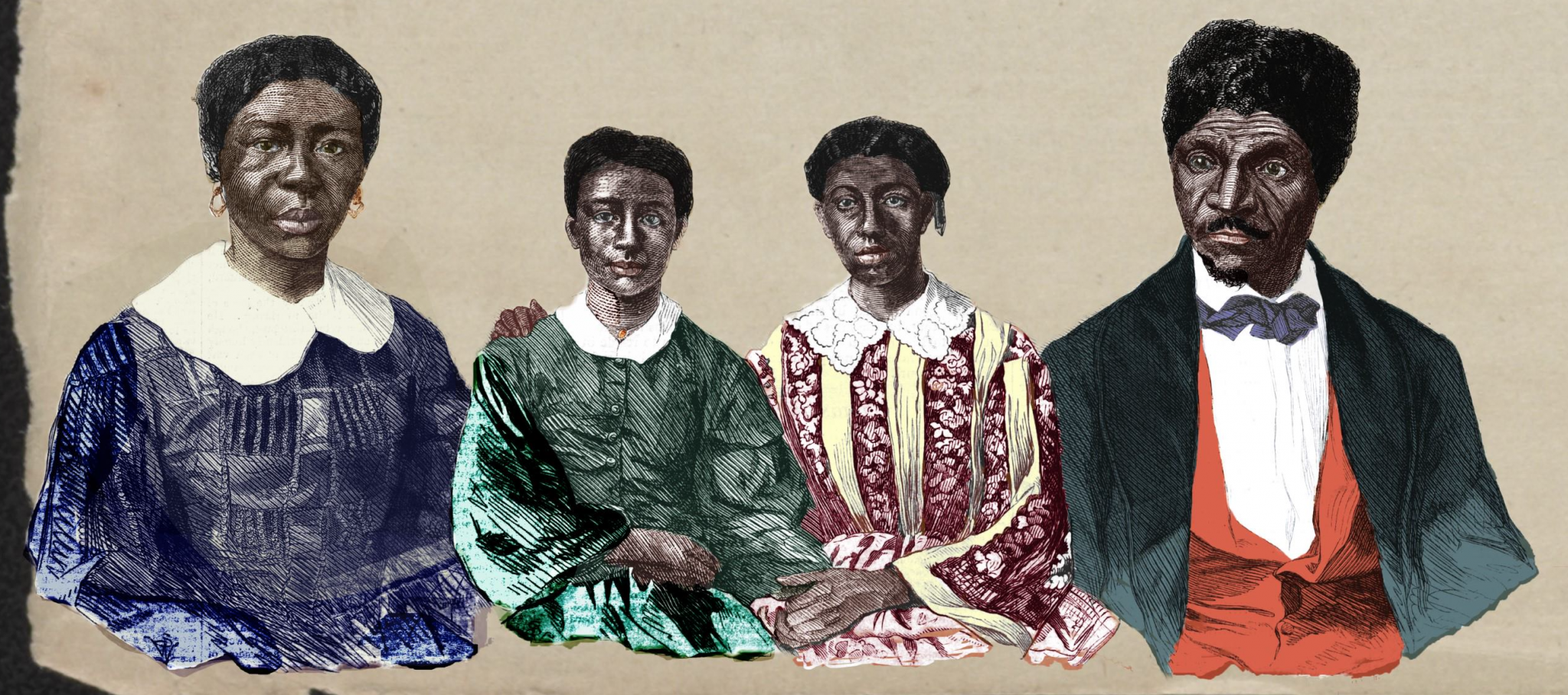
“Chief Justice Taney, in his opinion in the Dred Scott case, admits that the language of the Declaration is broad enough to include the whole human family, but he and Judge Douglas argue that the authors of that instrument did not intend to include negroes, by the fact that they did not at once, actually place them on an equality with the whites. Now this grave argument comes to just nothing at all, by the other fact, that they did not at once, or ever afterwards, actually place all white people on an equality with one or another. And this is the staple argument of both the Chief Justice and the Senator, for doing this obvious violence to the plain unmistakable language of the Declaration.
I think the authors of that notable instrument intended to include all men, but they did not intend to declare all men equal in all respects. They did not mean to say all were equal in color, size, intellect, moral developments, or social capacity. They defined with tolerable distinctness, in what respects they did consider all men created equal –equal in ‘certain inalienable rights, among which are life, liberty, and the pursuit of happiness.’ This they said, and this meant. They did not mean to assert the obvious untruth, that all were then actually enjoying that equality, nor yet, that they were about to confer it immediately upon them. In fact they had no power to confer such a boon. They meant simply to declare the right, so that the enforcement of it might follow as fast as circumstances should permit.
They meant to set up a standard maxim for free society, which should be familiar to all, and revered by all; constantly looked to, constantly labored for, and even though never perfectly attained, constantly approximated, and thereby constantly spreading and deepening its influence, and augmenting the happiness and value of life to all people of all colors everywhere. The assertion that ‘all men are created equal’ was of no practical use in effecting our separation from Great Britain; and it was placed in the Declaration, nor for that, but for future use. Its authors meant it to be, thank God, it is now proving itself, a stumbling block to those who in after times might seek to turn a free people back into the hateful paths of despotism. They knew the proneness of prosperity to breed tyrants, and they meant when such should re-appear in this fair land and commence their vocation they should find left for them at least one hard nut to crack.”
Speech at Chicago, July 10, 1858
That is the electric cord in that Declaration that links the hearts of patriotic and liberty-loving men together, that will link those patriotic hearts as long as the love of freedom exists in the minds of men throughout the world.
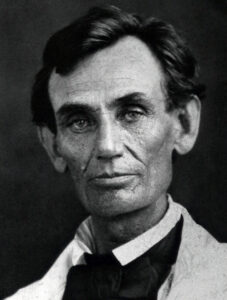
“We are now a mighty nation, we are thirty—or about thirty millions of people, and we own and inhabit about one-fifteenth part of the dry land of the whole earth. We run our memory back over the pages of history for about eighty-two years and we discover that we were then a very small people in point of numbers, vastly inferior to what we are now, with a vastly less extent of country,—with vastly less of everything we deem desirable among men,—we look upon the change as exceedingly advantageous to us and to our posterity, and we fix upon something that happened away back, as in some way or other being connected with this rise of prosperity. We find a race of men living in that day whom we claim as our fathers and grandfathers; they were iron men, they fought for the principle that they were contending for; and we understood that by what they then did it has followed that the degree of prosperity that we now enjoy has come to us.
We hold this annual celebration to remind ourselves of all the good done in this process of time of how it was done and who did it, and how we are historically connected with it; and we go from these meetings in better humor with ourselves—we feel more attached the one to the other, and more firmly bound to the country we inhabit. In every way we are better men in the age, and race, and country in which we live for these celebrations. But after we have done all this we have not yet reached the whole. There is something else connected with it.
We have besides these men—descended by blood from our ancestors—among us perhaps half our people who are not descendants at all of these men, they are men who have come from Europe—German, Irish, French and Scandinavian—men that have come from Europe themselves, or whose ancestors have come hither and settled here, finding themselves our equals in all things. If they look back through this history to trace their connection with those days by blood, they find they have none, they cannot carry themselves back into that glorious epoch and make themselves feel that they are part of us, but when they look through that old Declaration of Independence they find that those old men say that ‘We hold these truths to be self-evident, that all men are created equal,’ and then they feel that that moral sentiment taught in that day evidences their relation to those men, that it is the father of all moral principle in them, and that they have a right to claim it as though they were blood of the blood, and flesh of the flesh of the men who wrote that Declaration, and so they are. That is the electric cord in that Declaration that links the hearts of patriotic and liberty-loving men together, that will link those patriotic hearts as long as the love of freedom exists in the minds of men throughout the world.
Lincoln to Henry Pierce and others, April 6, 1859
…to introduce into a merely revolutionary document, an abstract truth, applicable to all men and all times…
Fragment on Constitution and Union, January 1861
The assertion of that principle, at that time, was the word, ‘fitly spoken’ which has proved an ‘apple of gold’ to us. The Union, and the Constitution, are the picture of silver, subsequently framed around it.
Gettysburg Address, November 19, 1863
Four score and seven years ago our fathers brought forth, upon this continent, a new nation, conceived in Liberty, and dedicated to the proposition that all men are created equal.
Four score and seven years ago our fathers brought forth, upon this continent, a new nation, conceived in Liberty, and dedicated to the proposition that all men are created equal.
Now we are engaged in a great civil war, testing whether that nation, or any nation so conceived, and so dedicated, can long endure. We are met on a great battle-field of that war. We have come to dedicate a portion of that field, as a final resting-place for those who here gave their lives, that that nation might live. It is altogether fitting and proper that we should do this.
But, in a larger sense, we can not dedicate, we can not consecrate—we can not hallow—this ground. The brave men, living and dead, who struggled here, have consecrated it far above our poor power to add or detract. The world will little note, nor long remember what we say here, but it can never forget what they did here.
It is for us, the living, rather, to be dedicated here to the unfinished work which they who fought here, have, thus far, so nobly advanced. It is rather for us to be here dedicated to the great task remaining before us—that from these honored dead we take increased devotion to that cause for which they here gave the last full measure of devotion—that we here highly resolve that these dead shall not have died in vain—that this nation, under God, shall have a new birth of freedom—and that government of the people, by the people, for the people, shall not perish from the earth.
